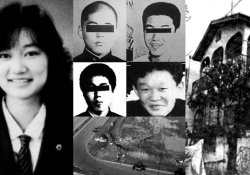The Unforgettable Tragedy Of Junko Furuta: A Legacy Of Injustice
In the annals of true crime, some cases stand out not just for their brutality, but for the profound questions they raise about human cruelty, the failings of justice, and the enduring impact on society. The case of Junko Furuta is one such tragedy, a harrowing narrative that continues to haunt those who learn of it. It serves as a stark reminder of the darkest corners of human nature and the critical need for robust justice systems.
Junko Furuta was a Japanese schoolgirl from Misato City in Tokyo, a typical high school student with a life ahead of her. In 1988, her promising future was brutally snatched away when she was kidnapped and subjected to the most horrendous torture and abuse until her monstrous kidnappers, Hiroshi Miyano, Jō Ogura, Shinji Minato, and Yasushi Watanabe, finally murdered her. Her story is not just a tale of crime, but a devastating account of unimaginable suffering and a controversial pursuit of justice.
The Abduction and the Beginning of a Nightmare
On November 25, 1988, Junko Furuta, a Japanese high school student, was abducted by four teenagers. This act marked the beginning of a 40-day ordeal that would become one of the most infamous and horrific crimes in Japan's history. The primary perpetrators—Hiroshi Miyano, Jō Ogura, Shinji Minato, and Yasushi Watanabe—were young themselves, yet their actions would demonstrate a depravity that shocked the world.
Once Junko Furuta was held captive in Shinji Minato's home, her nightmare escalated rapidly. What began as a terrifying abduction quickly devolved into a systematic campaign of torture and abuse. The initial captors were not content with merely holding her; the ringleader began inviting others to the house to participate in the sexual assault and torture of the teen. This chilling detail highlights the rapid descent into collective sadism, turning a private residence into a chamber of horrors where Junko was stripped of her dignity and humanity.
A Reign of Unimaginable Torment
During her captivity, Junko endured unimaginable torments. For 40 agonizing days, she was subjected to a relentless barrage of physical and sexual assault, starvation, and emotional abuse. The details of what she suffered are so graphic and extensive that they are often omitted from public discourse, deemed too disturbing for general consumption. The sheer scale and variety of the torture inflicted upon her speak to a level of cruelty that defies comprehension.
Her captors systematically dehumanized her, pushing the boundaries of cruelty with each passing day. She was deprived of basic necessities, subjected to unimaginable pain, and denied any semblance of escape or relief. The psychological toll of such prolonged and severe abuse, coupled with the constant threat of further violence, must have been immense. The fact that multiple individuals participated in and witnessed these atrocities, often escalating the torment, paints a terrifying picture of mob mentality and the complete erosion of empathy.
While the details are much too graphic to itemize, reports and various summations of the case reveal a shocking summation of what Furuta was forced to endure. These accounts describe a living hell, where every conceivable form of abuse was inflicted upon her, turning her body into a canvas for their sadistic desires and her spirit into a vessel of unending pain. The sustained nature of the torture, over a period of 40 days, is particularly harrowing, indicating a deliberate and methodical approach to inflicting suffering rather than impulsive acts of violence.
The Tragic End and Discovery
After 40 days of unspeakable torment, Junko Furuta's ordeal came to a brutal end. Her captors, having pushed her body and spirit beyond all limits, finally murdered her. The circumstances of her death were as horrifying as her captivity, a final act of barbarity that extinguished a young life in the most tragic manner imaginable. Her body was later discovered in a concrete drum, a chilling testament to the lengths her murderers went to conceal their monstrous crime.
The discovery of her remains ignited a firestorm of public outrage across Japan. The sheer depravity of the crime, the youth of both the victim and the perpetrators, and the extended period of torture captured the nation's attention and revulsion. The arrests of Hiroshi Miyano, Jō Ogura, Shinji Minato, and Yasushi Watanabe brought a glimmer of hope for justice, but what followed in the legal proceedings would prove to be another source of profound public dismay.
Controversial Justice and Public Outrage
Despite the severity of their crimes—which included kidnapping, rape, torture, and murder—the perpetrators received surprisingly lenient sentences. This outcome was largely due to their minor status at the time of the crime and alleged remorse presented during their trials. The Japanese legal system, particularly concerning juvenile offenders, often prioritizes rehabilitation and lighter sentences for those under a certain age, aiming to give them a chance at reintegration into society.
However, in a case of such extreme brutality and prolonged suffering, the public found these sentences utterly inadequate. Hiroshi Miyano, the primary instigator, received the longest sentence, but even his punishment was seen by many as disproportionately light given the monstrous nature of his actions. The other perpetrators received even shorter terms, some serving only a few years before being released. This perceived leniency sparked widespread protests and calls for reform of the juvenile justice system in Japan.
The Furuta case became a rallying cry for victims' rights advocates and those demanding harsher penalties for heinous crimes, especially when committed by minors. It forced a national conversation about the balance between rehabilitation and retribution, and whether the age of an offender should mitigate responsibility for acts of such extreme cruelty. The public's anger stemmed from the belief that true justice for Junko Furuta had not been served, leaving a lasting scar on the collective consciousness.
Legacy and Remembrance
The Junko Furuta case remains a pivotal and deeply disturbing chapter in Japan's modern history. Its legacy extends far beyond the courtroom, influencing discussions on juvenile crime, victim protection, and the moral responsibilities of society. While the immediate legal outcomes were controversial, the case did contribute to a broader re-evaluation of juvenile justice laws in Japan, leading to some reforms aimed at addressing the concerns raised by this and similar cases.
More importantly, the case serves as a solemn reminder of Junko Furuta herself. Her name has become synonymous with unimaginable suffering, but also with the resilience of the human spirit in the face of ultimate evil. Remembering Junko Furuta is not about sensationalizing the horror she endured, but about acknowledging her humanity, honoring her memory, and ensuring that such atrocities are never forgotten. It is a call to vigilance against cruelty and a testament to the enduring fight for justice, even when it feels elusive.
In conclusion, the Junko Furuta case is a harrowing account of a young life tragically cut short by unimaginable cruelty. From her abduction and 40 days of systematic torture, including physical and sexual assault, starvation, and emotional abuse, to her eventual murder by Hiroshi Miyano, Jō Ogura, Shinji Minato, and Yasushi Watanabe, her story is one of profound suffering. The subsequent legal proceedings, which saw the perpetrators receive surprisingly lenient sentences due to their minor status and alleged remorse, ignited widespread public outrage and left a lasting impact on discussions surrounding justice and crime in Japan. Junko Furuta's case remains a stark and unforgettable tragedy, a testament to the darkest aspects of human nature and a somber reminder of the ongoing quest for true justice and remembrance.



Detail Author:
- Name : Dawson Moore Sr.
- Username : fparisian
- Email : boehm.charlotte@hudson.com
- Birthdate : 1985-10-28
- Address : 88680 Lynch Meadow Apt. 255 Christiansenberg, WA 04470-1714
- Phone : +1 (954) 932-8109
- Company : Emard-Veum
- Job : Social Scientists
- Bio : Deleniti commodi debitis excepturi aut suscipit inventore quod. Earum rerum est modi iure ut. Ad nisi est pariatur perspiciatis. Dolorem ut sed voluptates aliquid.
Socials
instagram:
- url : https://instagram.com/dalton_id
- username : dalton_id
- bio : Vitae possimus sunt natus. Est blanditiis voluptatem rem voluptatum quaerat dolor dolorem.
- followers : 4548
- following : 818
tiktok:
- url : https://tiktok.com/@dalton_real
- username : dalton_real
- bio : Est sint tenetur ratione. Adipisci fugit debitis corrupti ab in est.
- followers : 5075
- following : 2354
facebook:
- url : https://facebook.com/dalton.ebert
- username : dalton.ebert
- bio : Ipsa occaecati quos eaque sit expedita dignissimos officia.
- followers : 1519
- following : 474
twitter:
- url : https://twitter.com/dalton4988
- username : dalton4988
- bio : Corrupti iste et quibusdam alias et nulla velit. Non enim debitis rerum perspiciatis aut nobis non. Eaque ipsam est amet autem aut recusandae.
- followers : 6132
- following : 1421